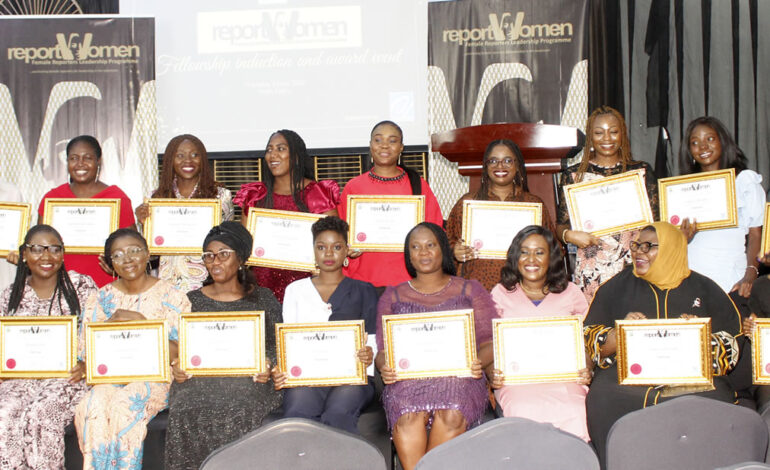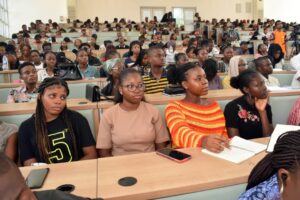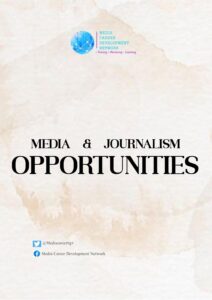Noah Aderoju of the Nigeria Institute of Journalism (NIJ), Lagos writes on the empowerment of female journalists through a leadership programme by the Wole Soyinka Centre for Investigative Journalism (WSCIJ).
Before participating in the 2021 Female Reporters Leadership Programme, (FRLP) organised by the Wole Soyinka Centre for Investigative Journalism (WSCIJ), Osaruonamen Ibizugbe, formerly of ITV Abuja did not see herself playing a leadership role in the media despite having been a journalist for seven years. During that time, Ibizugbe worked on a popular youth-focused television program “YOUTHS CAN” on ITV and interviewed many prominent persons.
Like Ibizugbe, Zainab Sanni, another participant in FRLP who is an award-winning investigative journalist and the deputy director of news at Agidigbo FM, a leading investigative journalism radio station in Ibadan was also more concerned with doing her job well than taking up leadership roles.
Ibizugbe however, now actively takes responsibility for training her colleagues and is now the Project Officer (Media) at the Centre for Journalism Innovation and Development (CJID)
Sanni is also no longer only focused on performing her designated role but has assumed the role of ensuring that all the interns in her station are actively engaged during their period of attachment and gain the knowledge they ought to. She also trained campus journalists at the University of Ibadan that will now be sending two female campus journalists to her newsroom yearly to work with her on women and girls-focused stories.
The two female journalists are among 74 fellows of the FRLP, since its inception in 2017, which is a response to the low reportage of issues relating to women and girls and less female representation in the leadership of newsrooms according to research findings by WSCIJ and other organisations.
The study of Media Representation of Nigerian Women in the News which analyzed the content of selected top newspapers in Nigeria between January 2015 and December 2017 showed that the volume of news stories published about women is low and lacks prominence, mostly reinforcing the traditional gender roles in the country.
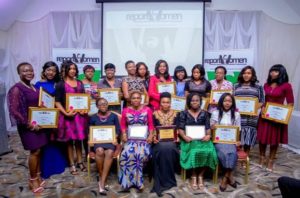
Response to the disparity problem
Convinced of the need to continue and expand its Report Women Project of 2014 which trained 134 reporters across Nigeria and enabled the execution of 65 girl child and women-focused stories, WSCIJ partnered with Free Press Unlimited to initiate the FRLP in 2017. Free Press Unlimited is an international non-governmental organization that supports the production of independent and reliable information for people globally.
The fellowship is a training and mentorship program for selected full-time Nigerian female journalists who have worked for at least three years in any genre of the profession.
It seeks to equip them with leadership skills and position them to take opportunities to lead, provide capacity development for advanced nuanced reporting and create a vibrant cohort of female practitioners who can mainstream girls and women in news reporting.
The journey to change
The fellowship which is open to professional full-time and freelance female journalists in Nigeria with a minimum of three years of experience calls for application usually in the second quarter of the year and runs for a short period before the assessment and announcement of the selected journalist for the cohort. The cohort goes through a mandatory four-day in-person immersion training on leadership, sexual and gender-based violence, criminal justice and other girls and women issues and six-month mentoring with experts in journalism and gender issues. Afterwards, each cohort member will execute her chosen story and leadership projects with the help of her mentors and support from the organisation. A few weeks into this execution period is the Share Fair, an accountability meeting where the participants come together to share their progress reports and updates on their leadership and story projects with the mentors and other participants. After completing all these comes the Award and induction ceremony where the cohort officially becomes fellows and is inducted into the Report Women Network. Some fellows will be awarded for their outstanding stories and leadership projects, receiving prizes of cash, laptop, and award plaques.
Impact of the fellowship.
The capacity-building fellowship has made some notable influence on the career of the participants based on the findings of the 2020 Impact Assessment Survey which sampled the thoughts of 67 respondents, consisting of fellows (of 2017-2019 cohorts), mentors, references of the fellows and beneficiaries of the leadership projects.
The survey revealed that of the 41 fellows who completed the survey, 24 were promoted or given higher responsibilities in their organisations after the fellowship. The improvement in their portfolios ranged from rising to becoming head of units or news to becoming part of the management cadre, levelling shoulders with their male counterparts.
Kofoworola Bello Osagie, former head of education desk at The Nation Newspaper and now the commissioning editor, Nigeria for The Conversation Africa is one of the 2021 fellows who changed job roles. She shared that the programme inspired her to push herself to do more even though she already seems to be an authority in her field, having spent 15 years as a journalist on the education beat.
Kofoworola also shared how the knowledge she gained from the session on budgeting from the fellowship helped her secure a grant from the U.S International Visitors Leadership Program (IVLP) to execute a fact-checking and digital skill training project for women journalists. She noted that before the FRLP, whenever she is making an application and the issue of budgeting comes up, she backs out. “The fact that we went through that session helped to boost my confidence, that I can do this…that was really the first time I started and completed such application.” She said despite the several reviews and back and forth she emerged as one of the finalists
Aneta Felix of BBC and Ann Godwin of The Guardian won a fully funded Mastercard Foundation scholarship for a master’s degree and the Africa Data Hub Community Journalism Fellowship Grant respectively. Khadija Ishaq Bawas, formerly of Liberty TV Kano also become confident enough to start her own media organisation, KAMED Media Hub, focusing on women and girls issues.
The fellows have heavily dotted the Nigerian media landscape with women and girls focused. They have contributed in-depth and critical reports on areas like reproductive rights, health and maternity, governance and political participation, communal clashes and community issues as it affects women, trafficking, rape and abuse, education and labour matters as it concerns Nigerian women and girls.
The 2021 story projects focusing on SGBV, and criminal justice produced reports that ranged from stories about the Violence Against Persons Prohibition VAPP law in Nigerian states to stories about rape and how law enforcement agencies respond to it. Stories about the plight of pregnant inmates in Nigerian correctional centres, sexual harassment, and gender-based violence in the media and education sectors were also produced.
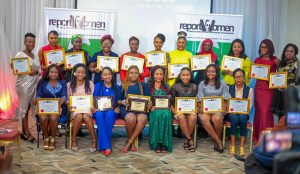
Views of some stakeholders of the program.
One of the resource persons for the programme, who has been training and mentoring every set of the fellows since 2017, Lekan Otufodunrin, Executive Director of the Media Career Development Network, said the programme availed him a mutual learning experience. “I have had the unique opportunity to train, mentor and learn from the fellowship. It helped me to enhance my mentoring and coaching work and expand my network with female journalists worldwide”
Otufodunrin believes the centre should be commended for the intentional practical response to addressing the gender disparity in the Nigerian media space. He hopes that more female journalists will be selected.
Olufunke Fayemi, one of the pioneer fellows of the FRLP in 2017 and now the co-chair of Report Women Network, the alumni body of the fellows, noted that the most notable challenge while executing the program is funding. “The funding is what has not allowed the fellowship to take in as many participants as it should. The highest it has ever taken so far was 21, which was during the just concluded cohort. Compared to the number of applications received yearly it is still not enough to satisfy the number of people that want to be part of it,” Fayemi noted.
While the project enjoys praise from many journalists, its capital-intensive nature militates against its potential. It is believed that the program will achieve more if done twice a year but for the capital intensity, it still can’t be done yet.
As Fayemi also thinks, the capital needed to cover the expenses of participants from other countries is why the programme doesn’t really take participants from outside Nigeria despite receiving applications from countries like Kenya, Spain, Uganda, Ghana and The Gambia. Although there have been two participants, Theodora Aidoo and Josephine Akonor from Ghana in the 2018 and 2019 cohorts respectively.
The organization partners with international donor organisations like the Free Press Unlimited in 2017 and The Open Society Initiative for West Africa (OSIWA) now, Open Society Foundation (OSF) Africa, to execute each edition revealing the need for a strong financial backer for the project.
Need to stretch delivery to achieve more impact.
A tailored solution to the problem of gender disparity in Nigeria media like the FRLP is indeed a needed game-changer as it has proved to be in its few years of execution. However, to totally eliminate the problem, a yearly increase in the army of transformed female journalists who will fill leadership positions is not enough. The organisers and the fellows’ network need to partner with professional media unions and regulatory bodies in the media sector like the Nigeria Union of Journalists, Newspaper Proprietors Association of Nigeria, Broadcasting Organization of Nigeria and others to push for policies that will entrench the elimination of gender disparity in media practice.
Advocacy should be taken to media organizations through outreaches by the network to sensitize them on the need to review their editorial and management policies to allow more representation of women. It might need more than training a staff member to a powerhouse to convince the stakeholders of an organization to have a change of mind.
More can still be done with the training aspect of the programme. Training of such calibre with a goal so grand as that shouldn’t be limited to the yearly fellows alone. Course materials, guidebooks and other professional and educational/instructional tools should be produced from the training and made available to the remaining thousands of journalists who are not in the program, either for free or at a fee, like the African Women In Media (AWIM) program does. Creating instructional materials from training like this has the advantage of providing Nigerian Journalists with more nuanced and relatable content tailored for their kind. In addition to reaching more female journalists who can’t be accommodated by the fellowship yet, it provides the male counterparts with the opportunity to equally learn about reporting issues relating to women and girls because journalism as a profession does not recognize gender nor does it mandate women only to report women issues or vice versa.
“This story has been supported by Nigeria Health Watch through the Solutions Journalism Network, a nonprofit organization dedicated to rigorous and compelling reporting about responses to social problems, solutionsjournalism.org”
